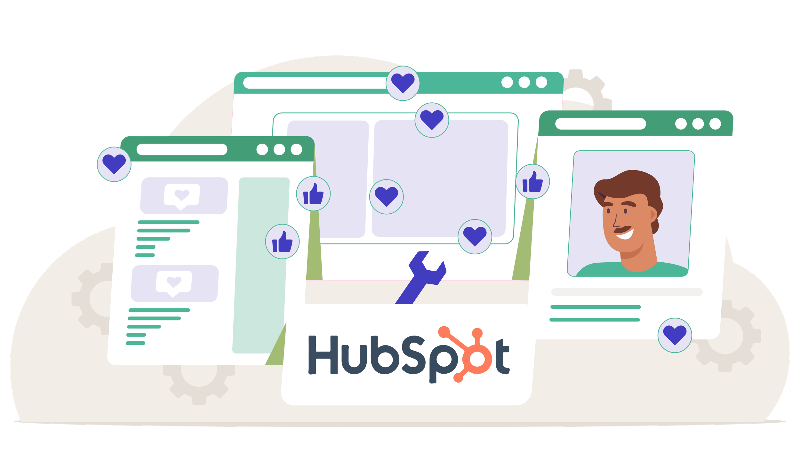Stellen wir uns einer Herausforderung: Versuchen Sie, ein großes (oder sogar mittleres) Unternehmen oder eine Organisation zu finden, die nicht über eine Social-Media-Präsenz verfügt oder keine Social-Media-Strategen in ihrem Marketingteam hat.
Sie kommen nicht weiter? Das liegt daran, dass soziale Medien ein wichtiges Instrument für die Personalbeschaffung sind - und eines, das nicht ignoriert werden sollte.


Soziale Medien können mehr sein als nur ein Mittel zur Kommunikation, Werbung oder zum Marketing zwischen einem Unternehmen und potenziellen Kunden. Soziale Medien können (und werden bereits von Unternehmen in verschiedenen Branchen eingesetzt) als leistungsfähiges Rekrutierungsinstrument genutzt werden, um den Personal- oder Talentmanagern von heute dabei zu helfen, die Qualitätskandidaten zu finden, die sie für das Wachstum und den Erfolg eines Unternehmens benötigen.
Noch vor fünf Jahren hätten Personalverantwortliche den Einsatz sozialer Medien als effektives Mittel zur Talentsuche vielleicht etwas schief angesehen. Der Datenschutz, die Einhaltung von Vorschriften und die Qualität von Bewerbern waren lohnende Überlegungen, wenn man über Facebook oder Instagram mit Arbeitssuchenden in Kontakt treten wollte. Aber in der heutigen Talentakquisitionslandschaft, in der Arbeitgeber Authentizität, Transparenz und innovatives Denken schätzen, können Personalverantwortliche die Macht der sozialen Medien als wesentlichen Teil ihrer allgemeinen Rekrutierungsstrategie einfach nicht mehr ignorieren.
Sehen wir uns einige Gründe an, warum Social Media ein wertvolles Instrument in den heutigen Rekrutierungsprozessen ist.
Kosteneffizienz
Je nach Branche reichen die traditionellen Methoden der Kandidatensuche von ein paar hundert Dollar für eine Anzeige in einer Jobbörse oder einem Berufsverband bis hin zu 10.000 bis 15.000 Dollar für eine professionelle Suchfirma. Und jeder Personalverantwortliche wird Ihnen bestätigen, dass oft mehr als eine Anzeige in einer professionellen Stellenbörse oder Organisation erforderlich ist, was bedeutet, dass sich diese Kosten schnell vervielfachen. Die Nutzung sozialer Medien als Rekrutierungsinstrument kann Ihre Rekrutierungskosten drastisch senken, da Ihr Unternehmen wahrscheinlich bereits eine Fangemeinde auf den wichtigsten sozialen Plattformen hat, was bedeutet, dass Sie über ein etabliertes Publikum verfügen, das Ihre Aufforderung zur Kandidatur verstärkt. Darüber hinaus können Sie bei bezahlten Kampagnen in sozialen Medien detaillierte demografische Angaben und Kriterien für Bewerber festlegen, um sicherzustellen, dass Ihre Stellenausschreibung die richtigen Personen erreicht.
Ein weiteres Element der Kosteneffizienz hängt von den Inhalten ab, die Sie veröffentlichen. Nehmen wir an, Sie sind bereit, über den Tellerrand hinauszuschauen und spezielle Inhalte für eine bestimmte Stelle zu produzieren (ein professionelles Foto, das mit der Stelle in Verbindung steht, ein Text mit 150 Wörtern als Teil des Beitrags). In diesem Fall erhöhen Sie die Chance Ihrer Follower, sich mit Ihren Inhalten zu beschäftigen, erheblich. Je größer die Beteiligung, desto mehr Menschen sehen Ihre Stellenausschreibung und desto mehr Geld können Sie für die Rekrutierung ausgeben.
Kontaktaufnahme mit passiven Arbeitssuchenden
Fragen Sie einen Personalverantwortlichen, und er wird Ihnen sagen, dass die wahre Hürde bei der Suche nach Spitzenkräften nicht darin besteht, die Person zu finden, die aktiv nach einer neuen Stelle sucht, sondern den passiven Stellensuchenden, der vielleicht nicht explizit einen Karriereschritt machen will, bis er mehr darüber erfährt, was Ihr Unternehmen zu bieten hat, wie er in Ihre Kultur und Organisation passt und wie Ihre Markenpersönlichkeit aussieht. Die Schwierigkeit besteht im Wesentlichen darin, den Bewerbern immer wieder ins Gedächtnis zu rufen, damit sie sofort an Sie denken, wenn sie nach ihrer nächsten Chance suchen. Die einfachste und kostengünstigste Möglichkeit, dies zu erreichen, besteht darin, ihre Facebook-, Twitter- oder LinkedIn-Feeds mit Inhalten zu füllen, die sich auf die Personalbeschaffung beziehen.
Wenn Sie passiven Stellensuchenden kontinuierlich die Möglichkeit geben, sich mit Ihrem Unternehmen in sozialen Netzwerken auszutauschen, tragen Sie außerdem dazu bei, Ihre Arbeitgebermarke aufzubauen und Ihre Geschichte einem größeren Publikum zu erzählen, als Sie es sonst könnten.
Bauen Sie die Marke Ihres Arbeitgebers auf.
Die Arbeitssuchenden von heute wollen eine Verbindung zu ihrem Arbeitgeber haben. Sie wollen das Gefühl haben, dass ihr Arbeitgeber zukunftsorientiert ist, und sehnen sich nach einem Gefühl der Authentizität und Ehrlichkeit in Bezug auf das Ethos eines Unternehmens. Die sozialen Medien bieten Unternehmen die perfekte Möglichkeit, ihre Arbeitgebermarke so zu gestalten und auszubauen, dass sie in Echtzeit mit den Stellensuchenden kommunizieren und mit ihnen in Kontakt treten können. Fotos, Videos, Erfahrungsberichte, Animationen und andere Inhalte in sozialen Medien können Personalverantwortlichen dabei helfen, den Vorhang zu lüften und zu zeigen, was ihr Unternehmen ausmacht und wie Arbeitssuchende in die Unternehmenskultur passen können.
Stellenbewerbern über ihr Telefon oder Mobilgerät einen Blick hinter die Kulissen Ihres Unternehmens zu gewähren, ist eine Selbstverständlichkeit, zumal der Prozentsatz der Bewerbungen, die über ein Telefon oder andere Geräte abgeschlossen werden, weiter steigt.
Reduzieren Sie die Zeit bis zur Einstellung.
Hier ist ein häufiges Szenario bei der Nutzung sozialer Netzwerke als Einstellungsinstrument: Ein Kandidat sieht einen Beitrag in sozialen Netzwerken, in dem für eine Stelle geworben wird, ist so fasziniert, dass er auf einen Link zu einer Stellenanzeige klickt, und schickt dann innerhalb weniger Minuten einen Lebenslauf als Antwort auf die Stellenanzeige. Als Personalverantwortlicher erhalten Sie dann eine Benachrichtigung und können den Lebenslauf im Wesentlichen in Echtzeit einsehen oder dem Bewerber sogar direkt eine Nachricht mit Folgefragen oder der Verfügbarkeit für ein Vorstellungsgespräch schicken. Die sozialen Medien haben einen Prozess, der früher Tage dauerte, auf die Zeit reduziert, die Sie normalerweise für Ihr Mittagessen benötigen. Jedes Tool, das den Personalverantwortlichen hilft, die Zeit bis zur Einstellung zu verkürzen, die Effizienz des Vorstellungsgesprächs oder des Überprüfungsprozesses zu steigern und eine effektivere, zeitnahe Kommunikation mit dem Bewerber zu fördern, ist ein entscheidender Vorteil, insbesondere auf dem heutigen Markt, auf dem der Wettbewerb um gute Bewerber am größten ist.
Verbesserte Berichte und Daten
Unabhängig davon, ob Sie eine integrierte Berichterstattungsfunktion einer bestimmten sozialen Plattform wie den Campaign Manager von Facebook nutzen oder sich für eine Plattform wie HootSuite entscheiden, um Ihre soziale Präsenz zu verwalten, hilft Ihnen die Möglichkeit detaillierter Berichte und Daten in Bezug auf Ansichten, Linkklicks, Freigaben und andere Elemente der Beteiligung dabei, den ROI besser zu bestimmen und eine genauere Geschichte darüber zu erzählen, wie Sie Ihre Stellenangebote für potenzielle Kandidaten positionieren. Budgets für die Personalbeschaffung sind unbestreitbar mit Berichten und Daten verknüpft, und die Nutzung sozialer Medien als Personalbeschaffungsinstrument bietet Ihnen viel detailliertere Analysen (sowie aussagekräftigere Erkenntnisse darüber, wer Ihre Kandidaten sind, wie sie Sie finden und welche Aspekte sie bei einem Arbeitgeber suchen) als jede der traditionelleren Methoden der Personalbeschaffung wie Radio, Fernsehen oder Stellenanzeigen in Jobbörsen.
Wenn die sozialen Medien den Unternehmen im Grunde eine Stimme geben, mit der sie in Echtzeit mit einem gefesselten Publikum kommunizieren und sich einbringen können, dann sollte die Nutzung dieser Stimme, um laut und stolz über Ihre Karrieremöglichkeiten und die Elemente Ihrer Unternehmenskultur zu sprechen, die Sie einzigartig machen, für Personalverantwortliche, die sich als echte Vordenker in der Talentakquise profilieren wollen, oberste Priorität haben.












Kommentar hinterlassen